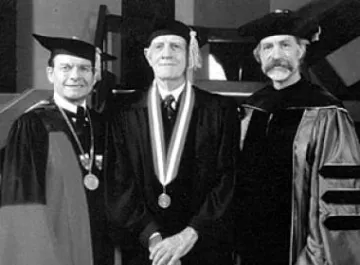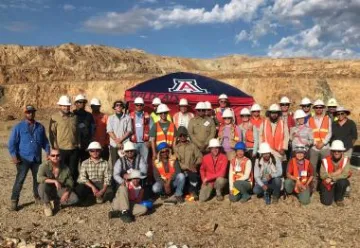David Lowell’s passing is a bittersweet reminder of the 20th anniversary of the first million dollar plus endowment in Geosciences, which enabled establishment of the Lowell Program in Economic Geology (LPEG). LPEG and the university-spanning Lowell Institute for Mineral Resources reflect David and Edith Lowell’s generosity and vision toward the Department and University.

David Lowell receives University of Arizona honorary doctorate in 2000
For many years, David interacted with faculty in Geosciences including George Davis and John Guilbert on topics in Cordilleran geology, including regional structure and porphyry copper deposits. Of his over 50 publications, the landmark 1970 Lowell and Guilbert paper on the distribution of hydrothermal alteration in porphyry copper systems remains one of the most widely cited papers in the field and has influenced generations of academic and exploration geologists. In recognition of these contributions to science and to education, he was award an honorary doctorate from the University in 2000, which followed his election to the National Academy of Engineering in 1999.
David’s passion around the power of solid, observational field geology informed his oft-expressed view that this must remain at the core of geological education, and that this approach is particularly important for economic geologists. Although he had made earlier gifts to Geosciences, notably in support of field camp, it wasn’t until conversations with Joaquin Ruiz and Mark Barton in the late 90s that he agreed to endow a program focused on applied economic geology, thus ensuring its sustainability in a top academic program at a time when other university programs in economic geology were disappearing nationwide. The idea was to supplement other, more academically oriented faculty positions, while providing opportunities for industry professionals and others with an applied bent. His gift ensured maintenance of a second economic geology faculty line as well as providing for a part-time program coordinator. Generous with his time as well as dollars, David helped with multiple contacts and discussions about what might work well, although he always insisted staying out of the decision-making process.

Students, industry participants and faculty in the 16th annual LPEG advanced ore deposits mapping field course (September 2019)
Building on David’s vision, the endowment, which allowed the hire of Eric Seedorff from industry in 2002, the newly founded Lowell Program took shape with the development of a novel professional masters degree and a major expansion of continuing education opportunities. The unique, Sloan Foundation-trademarked Professional Science Masters in Economic Geology (PSM) degree was created to be fully self-supporting and designed for professionals and others who wanted to combine solid scientific training with a business component. With the potential to complete a full masters in as little as 9 months, the PSM has attracted and graduated over two dozen students from 6 countries since its inception in 2007. Since 2004 well over 1,000 students (the vast majority from industry, representing 6 continents, >30 countries and almost 50 companies) have participated in LPEG’s unique intensive 10-12 day field courses. These courses have been self-supporting and also support many regular graduate students through paying for their participation and, in many cases, providing TA and RA stipends to support the broader program, particularly where other funds were not available. In aggregate, over $2M in direct field course income has supported LPEG and contributed to more than 50 other MS and PhD graduate degrees.
As these examples illustrate, David Lowell’s generosity to Geosciences and the Lowell Institute has been the catalyst for past success. Yet the most important contributions are still to come, as his gifts built the foundation for the University of Arizona to become a world leader in addressing the challenges of humanity’s use of earth materials. His example illustrates how much universities can do, with philanthropic support, to build the academic programs that educate the next generation of industry and academic scientists. We need more alumni like David Lowell, who left a lasting foundation in education and science alike, and whose philanthropy provided a model for mineral resources programs to thrive in today’s competitive landscape.

